Iodine
Year of discovery: 1811 | Bernard Courtois
Trace amounts of the iodine ion (called iodide) are essential for life. Iodine is an integral part of thyroid hormones, which regulate body temperature, metabolic rate, cell reproduction, stimulate growth, blood cell production, nerve and muscle function and much more. These hormones control the rate at which cells consume oxygen. By doing so, they influence the amount of energy released when the body is at complete rest. Most (70-80%) of the body's iodine is found in the thyroid gland.
Main sources of iodine
Most foods are low in iodine. Iodized salt, seafood, plants grown in iodine-rich soil and animals fed these plants or feed containing iodine are good sources of this element. Some foods can be good sources of iodine if iodized salt is used in their preparation (such as bread).
Bioavailability of iodine
Typically, iodine absorption from food is very high (>90%). Some foods (e.g., cassava, millet, lima beans, cabbage) contain substances called goitrogens. These substances inhibit the transport of iodine to the thyroid gland and interfere with the production of thyroid hormones. Eating goitrogen-containing foods in large quantities can limit iodine absorption and utilization by the body. In general, most people tolerate higher iodine intake from food and supplements well.
Risks associated with insufficient iodine intake
Iodine deficiency has adverse effects at all stages of development, but is most detrimental to the developing brain. In addition to regulating many aspects of growth and development, thyroid hormone plays an important role during nerve myelination - a process most active before and shortly after birth. Therefore, during pregnancy, an iodine-deficient diet can increase the risk of mental retardation. An enlarged thyroid gland or goiter is one of the most visible symptoms of iodine deficiency.



